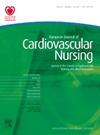Experiences of patients and nurses with thirst in advanced chronic heart failure: a mixed methods study
IF 3.9
3区 医学
Q2 CARDIAC & CARDIOVASCULAR SYSTEMS
引用次数: 0
Abstract
Background Many patients with chronic heart failure (CHF) express thirst. Perceptions of thirst and strategies for reducing this symptom can differ between patients and nurses. Purpose As part of a study to develop and evaluate a nurse-based counselling intervention on thirst in patients with advanced CHF waiting for heart transplantation, we aimed to assess patients' and nurses' perceptions on thirst, possible strategies, as well as information needs and information transfer. Methods Mixed methods study consisting of semi-structured interviews with hospitalized patients waiting for a heart transplantation in Germany. Interviews focussed on experiences with thirst, needs and requirements, and experiences with the information provided by healthcare professionals. We also conducted focus groups and an online survey with German nurses with experiences in the care of cardiac patients. Topics of the focus groups were the perceptions and handling of the symptom in nursing practice as well as the provision of information and counselling. The survey was based on the results of the focus groups and current research findings. In addition to work-related data, we asked questions about the relevance of thirst, the causes of this symptom, recommended interventions and the need for counselling. We analysed quantitative data descriptively and qualitative data using content analysis. Results We conducted 10 interviews with patients (mean age: 43.5 years; 30% female; duration of CHF: 25 days to 21 years; length of stay: 7 to 116 days). All participants had a prescribed fluid restriction. Perceived thirst markedly differed between patients, with some reporting thirst to be very distressing. Most patients described that the feeling of thirst increased especially at mealtimes. Individual strategies for reducing thirst also differed between patients depended on disease durations and their therapeutic regiment. Some patients rated the information provision by healthcare professionals concerning thirst as insufficient. In addition, we conducted two focus groups with respectively 5 nurses from two university hospitals in Germany. 59 nurses participated in the survey. Nurses (81.4% working in a hospital; 54.2% already have at least 5 years of experience in care of cardiac patients) stated that the feeling of thirst in patients with CHF is of great importance in nursing practice, but only 44.1% specified to regularly assess thirst. The perceived most common cause of thirst was a prescribed fluid restriction (93.2%) and diuretics (79.7%). Among others, most nurses recommended ice cubes as intervention to reduce thirst and considered counselling interventions as important. Conclusion(s) The occurrence of thirst is an important issue for patients with advanced CHF. The perception of the symptom varies greatly. Individualised, evidence-based strategies for symptom management are required.晚期慢性心力衰竭患者和护士的口渴体验:一项混合方法研究
背景 许多慢性心力衰竭(CHF)患者都有口渴的症状。患者和护士对口渴的看法以及减轻这一症状的策略可能有所不同。目的 作为开发和评估以护士为基础的、针对等待心脏移植的晚期慢性心力衰竭患者口渴问题的咨询干预研究的一部分,我们旨在评估患者和护士对口渴的看法、可能采取的策略以及信息需求和信息传递。方法 混合方法研究,包括对德国等待心脏移植的住院患者进行半结构化访谈。访谈的重点是口渴的经历、需求和要求,以及对医护人员所提供信息的体验。我们还与具有心脏病患者护理经验的德国护士进行了焦点小组讨论和在线调查。焦点小组讨论的主题是护理实践中对这一症状的认识和处理,以及提供信息和咨询。调查以焦点小组的结果和当前的研究成果为基础。除了与工作相关的数据外,我们还就口渴的相关性、这一症状的原因、建议采取的干预措施以及咨询的必要性等方面提出了问题。我们对定量数据进行了描述性分析,对定性数据进行了内容分析。结果 我们对患者(平均年龄:43.5 岁;30% 为女性;CHF 病程:25 天至 21 年;住院时间:7 天至 116 天)进行了 10 次访谈。所有参与者都有规定的液体限制。不同患者对口渴的感觉明显不同,有些患者称口渴非常难受。大多数患者表示,口渴的感觉会加重,尤其是在进餐时。根据病程和治疗方案的不同,患者减轻口渴的个人策略也不尽相同。一些患者认为医护人员提供的有关口渴的信息不够充分。此外,我们还与来自德国两所大学医院的 5 名护士进行了两次焦点小组讨论。59 名护士参与了调查。护士(81.4% 在医院工作;54.2% 已有至少 5 年的心脏病患者护理经验)表示,CHF 患者的口渴感在护理实践中非常重要,但只有 44.1% 的护士明确表示会定期评估口渴感。最常见的口渴原因是处方中的液体限制(93.2%)和利尿剂(79.7%)。除其他原因外,大多数护士建议使用冰块作为缓解口渴的干预措施,并认为辅导干预措施非常重要。结论 口渴是晚期慢性心力衰竭患者的一个重要问题。人们对这一症状的认识差异很大。需要制定个性化的、以证据为基础的症状管理策略。
本文章由计算机程序翻译,如有差异,请以英文原文为准。
求助全文
约1分钟内获得全文
求助全文
来源期刊

European Journal of Cardiovascular Nursing
CARDIAC & CARDIOVASCULAR SYSTEMS-NURSING
CiteScore
5.10
自引率
10.30%
发文量
247
审稿时长
6-12 weeks
期刊介绍:
The peer-reviewed journal of the European Society of Cardiology’s Council on Cardiovascular Nursing and Allied Professions (CCNAP) covering the broad field of cardiovascular nursing including chronic and acute care, cardiac rehabilitation, primary and secondary prevention, heart failure, acute coronary syndromes, interventional cardiology, cardiac care, and vascular nursing.
 求助内容:
求助内容: 应助结果提醒方式:
应助结果提醒方式:


